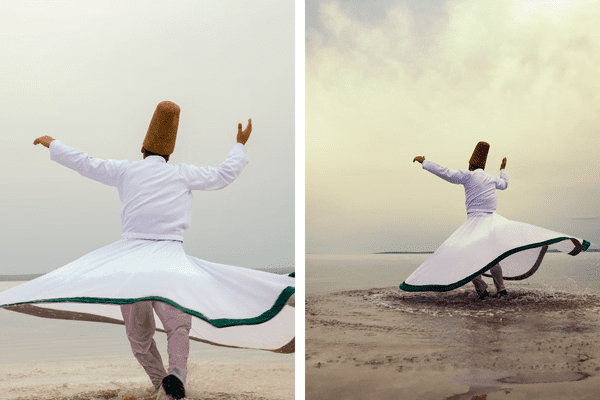苏菲主义简介及其哲学根源
苏菲主义通常被描述为伊斯兰神秘主义,它代表了伊斯兰教丰富而广博的传统,强调内在净化和追求与真主更密切的关系。苏菲主义植根于伊斯兰教的早期几个世纪,起源于 8 世纪,借鉴了先知穆罕默德的教诲和榜样,他的一生是奉献、谦逊和精神强度的典范。苏菲 "一词本身据说来源于阿拉伯语 "suf",意为羊毛,指的是早期修行者所穿的简单羊毛服装,象征着他们苦行僧式的生活方式和对世俗欲望的超脱。
苏菲派的核心原则包括这样一种信念,即通过祈祷、冥想和诵念真主的名字等精神修炼,心灵可以得到净化。苏菲教义的核心是 "Tazkiyah"(净化)和 "Tasawwuf"(神秘之路)的概念。苏菲寻求获得 "ma'rifah"(悟性)或精神知识,旨在超越单纯的仪式崇拜,体验与神的本质直接的个人联系。
苏菲主义早期发展的关键人物对其传播和演变产生了深远影响。其中,哈桑-巴斯里(Hasan al-Basri)以虔诚和雄辩的真主之爱与仁慈布道而著称。另一位关键人物是拉比阿-阿达维耶,她是一位女圣人,提出了对真主无私的爱的主题,强调强烈的虔诚之爱,不奢望天堂,也不害怕地狱之火。
随着苏菲教义在伊斯兰世界的传播,它们最终在当时奥斯曼帝国的中心伊斯坦布尔找到了肥沃的土壤。这座城市的战略和文化意义使其成为各种苏菲教派或 "塔里卡 "的中心。其中最著名的是梅夫列维教派,该教派由著名诗人和神秘主义者贾拉尔-阿尔丁-鲁米(Jalāl al-Dīn Rūmī)的追随者创立,以其独特的旋风苦行僧仪式而闻名,象征着通往真主的精神之旅。另一个重要的教团是哈尔维蒂教团(Halveti),该教团强调默念和集体精神锻炼。
每个修会都发展了独特的做法和仪式,旨在培养更深层次的神秘体验。通过其独特的仪式和教义,这些苏菲教派极大地影响了伊斯坦布尔的精神和文化景观,为这座城市丰富的遗产留下了不可磨灭的印记。
伊斯坦布尔苏菲教派的建立可以追溯到塞尔柱时代,当时这座城市开始成为包括苏菲主义在内的各种伊斯兰传统的大熔炉。最初大量涌入的苏菲修行者和学者为日后奥斯曼帝国一场重要的精神和文化运动奠定了基础。被称为 "泰克"(tekke)的苏菲会馆在这一过程中发挥了至关重要的作用,它们不仅是礼拜场所,也是社交和文化聚会的中心。这些集会所成为奥斯曼帝国社会结构中不可或缺的一部分,促进了社区联系并提供了精神慰藉。
主要苏菲教派
苏菲教派中最著名的是梅夫列维教派和贝克塔什教派,这两个教派都在伊斯坦布尔的宗教和文化景观中留下了不可磨灭的印记。梅夫列维教派由著名波斯诗人和神秘主义者鲁米的追随者创立,他们的旋风舞尤其闻名遐迩,旋风舞是一种凄美而令人着迷的仪式,象征着灵魂走向神灵的旅程。该教派在伊斯坦布尔的tekke是精神修行和知识交流的集中地,吸引了来自该地区的信徒和学者。
贝克塔什教团通常与禁卫军军团联系在一起,在奥斯曼帝国的政治和军事领域具有很大的影响力。他们的苏菲主义融合了各种伊斯兰教和神秘主义传统,使更多的社会阶层能够了解苏菲主义。伊斯坦布尔的贝克塔什会所不仅提供精神指导,还提供教育服务,进一步丰富了城市的知识生活。
历史背景和重要人物
一系列历史事件和重要人物促进了伊斯坦布尔苏非主义的兴盛。奥斯曼帝国苏丹的赞助,尤其是征服者穆罕默德苏丹和苏莱曼大帝统治时期的赞助,为众多的 "泰克 "的建立和繁荣提供了动力。受人尊敬的苏菲大师,如影响了早期奥斯曼帝国领导人的谢赫-艾德巴里,以及后来的人物,如梅夫勒维教派的谢赫-加利普,都对伊斯坦布尔的精神和文化氛围做出了重大贡献。
苏菲教派在伊斯坦布尔根深蒂固,不仅塑造了伊斯坦布尔的精神风貌,还丰富了这座城市的文化遗产,使其至今仍是精神朝圣和文化交流的焦点。
旋转苦行僧和梅夫列维仪式
梅夫勒维教派因其令人着迷的旋风舞而闻名于世,代表着与苏菲精神和贾拉鲁丁-鲁米(Jalaluddin Rumi)教义的深刻联系。梅夫列维派于 13 世纪在土耳其科尼亚成立,其核心活动是塞马仪式--一种超越美学的迷人仪式。该仪式通常在伊斯坦布尔举行,体现了苏菲信仰的核心原则--通往神圣之爱与合一的灵魂之旅。
旋转苦行僧的舞蹈不仅是一种奇观,更是一种深刻的精神修炼。从音乐和赞美诗到旋转本身,塞玛的每一个元素都象征着苏菲宇宙观的复杂方面。仪式包括四个主要阶段,称为 "萨拉姆",与神圣的目的交织在一起。最初的阶段代表着对真理的追求,随后是承认真主的存在,顺从神爱的行为,最后是实现与造物主的团聚。
传统的中东乐器,如长笛和库杜姆鼓,为仪式伴奏,每个音符都蕴含着精神意义。赞美诗和吟唱通常由鲁米的神秘诗歌组成,更加突出了仪式的精神氛围。苦行僧身着白色长袍,象征裹尸布,黑色斗篷代表世俗的羁绊,他们赤脚表演舞蹈,表示尊敬和谦卑。
旋转本身就是一种极具象征意义的行为,反映了精神的升华。苦行僧伸展双臂,右手举向天,左手指向地,成为神界和尘世之间的通道。他们的旋转动作模仿天体的旋转,促进与宇宙存在的和谐统一。
梅夫勒维教派的核心是受人尊敬的苏菲派神秘主义者和诗人贾拉鲁丁-鲁米(Jalaluddin Rumi)的生平和教义。鲁米的哲学围绕着神爱的概念和对精神启蒙的永恒追求。他的诗歌蕴含着丰富的隐喻和寓言,至今仍在激励着梅夫列维教派的仪式,概括了苏菲神秘主义的精髓。
伊斯坦布尔的当代苏菲习俗和仪式
在当代伊斯坦布尔,苏菲派的做法和仪式既保留了其历史精髓,又适应了现代动态。这座城市拥有丰富的精神遗产,仍然是各种苏菲教派(通常称为 Tariqas)充满活力的中心。其中最负盛名的是以旋转苦行僧而闻名的梅夫列维教派以及纳格什班迪和卡迪里教派。这些团体坚持独特的仪式和教义,不断引起信徒的共鸣并吸引新的追随者。
伊斯坦布尔现代苏菲仪式的特点是公共和私人仪式相结合。旋转苦行僧的公开表演,尤其是在加拉塔梅夫列维汉内西宫举行的表演,已成为当地人和游客的主要文化体验。在这些活动中,人们可以领略到推动这种习俗的精神狂热,展示苏菲传统的冥想和艺术魅力。相比之下,私人聚会(如 Dhikr 会议)通常仅限于虔诚的成员参加,在全市各地的 Tekkes(苏菲小屋)举行。这些私密聚会为苏菲团体提供了一个更深层次的精神反思和社区联系的空间。
苏菲仪式在当代土耳其社会中的文化意义怎么强调都不为过。苏菲仪式是土耳其丰富的历史和精神文化与其当今身份之间的重要纽带。苏菲音乐、诗歌和舞蹈继续影响着艺术,为现代伊斯坦布尔快节奏的世俗生活提供了一种精神对立面。国家在保护这些传统方面发挥着多方面的作用;虽然曾有过限制时期,但目前有一个法律框架在一定范围内支持这种做法,促进保护与创新之间的平衡。
如今,伊斯坦布尔的苏菲仪式吸引着不同的观众。来自全球各地的精神追求者被苏菲教义和体验的深刻内涵所吸引,而游客则被其独特的文化表演所倾倒。这种双重吸引力确保了苏菲传统尽管面临着现代挑战,但仍然是伊斯坦布尔文化结构中一个重要而充满活力的组成部分。





0 条评论